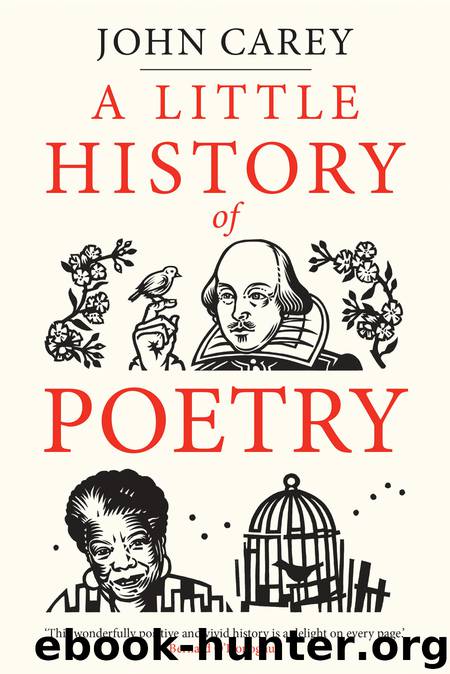A Little History of Poetry by John Carey

Author:John Carey
Language: eng
Format: epub
ISBN: 9780300232226
Publisher: Yale University Press
CHAPTER 23
Reform, Resolve and Religion: Victorian Women Poets
ELIZABETH BARRETT BROWNING, EMILY BRONTË, CHRISTINA ROSSETTI
Elizabeth Barrett Browning (1806–1861) was a child prodigy. She began writing poetry at four, and at twelve wrote an epic on the Battle of Marathon. She learned Greek and Hebrew, and translated Aeschylus’ Prometheus Bound.
Her commitment to social justice was unflinching. Her father’s wealth came from Jamaican sugar plantations, but she campaigned resolutely against slavery. In her poem ‘A Curse for a Nation’, an angel commands her to curse those who, like her family, live by exploitation. She pleads that ties of gratitude and blood prevent her, but the angel insists and she writes the curse. When slavery was abolished in Britain’s dominions in 1833 her family’s fortunes were severely affected.
Her 1842 poem ‘The Cry of the Children’ was part of a successful campaign to restrict the use of child labour in mines and factories. She was inspired, too, by Mary Wollstonecraft’s A Vindication of the Rights of Woman, and in her verse-novel Aurora Leigh (1856) her heroine, angered by a male cousin’s assertion that women cannot write poetry, goes off to London and earns her living as a poet. This was not fanciful. Aurora’s success mirrors Barrett Browning’s own. Her poems were acclaimed, and on the death of Wordsworth she, rather than Tennyson, was widely expected to become Poet Laureate.
Feminist critics have revived her reputation after a period of neglect, but some of her poems have never gone out of currency. Sonnet 43 of ‘Sonnets from the Portuguese’, ‘How do I love thee? Let me count the ways’, is regularly read at weddings. (The sonnets were not really ‘from the Portuguese’, but original love poems written by her to Robert. Publishing them, they agreed to conceal their private nature.) Her religious poems (such as ‘Speak low to me, my Saviour, low and sweet’) are also love poems of a kind. Even Sonnet 43 ends on a religious note:
. . . if God choose,
I shall but love thee better after death.
For many, her most powerful poem is ‘A Musical Instrument’. It was also her last, and published only after her death. It reads like a critique of almost everything she had written before, or, alternatively, like a defence of her gentler kind of poetry against the cruelty and violence of the male muse:
What was he doing, the great god Pan,
Down in the reeds by the river?
Spreading ruin and scattering ban,
Splashing and paddling with hoofs of a goat,
And breaking the golden lilies afloat
With the dragon-fly on the river.
Download
This site does not store any files on its server. We only index and link to content provided by other sites. Please contact the content providers to delete copyright contents if any and email us, we'll remove relevant links or contents immediately.
| Ancient & Classical | Arthurian Romance |
| Beat Generation | Feminist |
| Gothic & Romantic | LGBT |
| Medieval | Modern |
| Modernism | Postmodernism |
| Renaissance | Shakespeare |
| Surrealism | Victorian |
4 3 2 1: A Novel by Paul Auster(11049)
The handmaid's tale by Margaret Atwood(6852)
Giovanni's Room by James Baldwin(5878)
Big Magic: Creative Living Beyond Fear by Elizabeth Gilbert(4723)
Asking the Right Questions: A Guide to Critical Thinking by M. Neil Browne & Stuart M. Keeley(4576)
On Writing A Memoir of the Craft by Stephen King(4213)
Ego Is the Enemy by Ryan Holiday(3991)
Ken Follett - World without end by Ken Follett(3972)
The Body: A Guide for Occupants by Bill Bryson(3802)
Bluets by Maggie Nelson(3711)
Adulting by Kelly Williams Brown(3671)
Guilty Pleasures by Laurell K Hamilton(3586)
Eat That Frog! by Brian Tracy(3514)
White Noise - A Novel by Don DeLillo(3436)
The Poetry of Pablo Neruda by Pablo Neruda(3367)
Alive: The Story of the Andes Survivors by Piers Paul Read(3311)
The Bookshop by Penelope Fitzgerald(3226)
The Book of Joy by Dalai Lama(3218)
Fingerprints of the Gods by Graham Hancock(3213)
